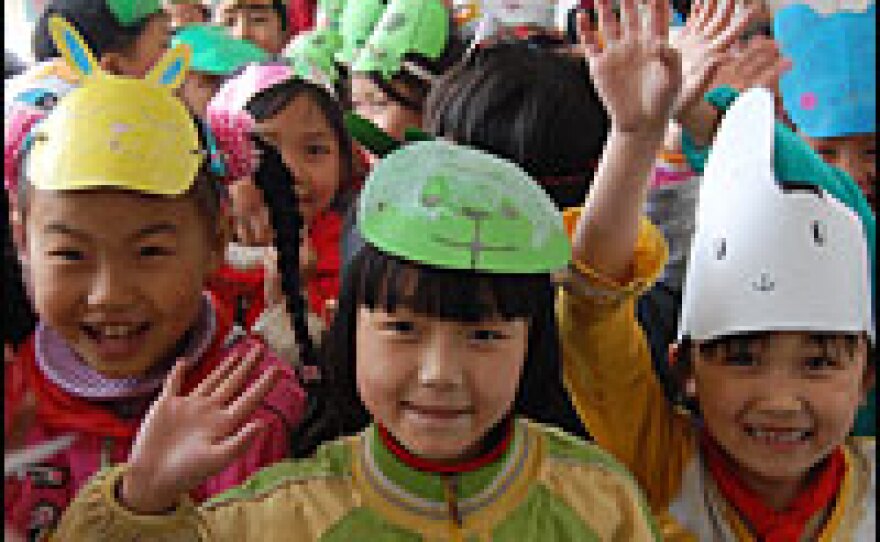

Before the earthquake in China's Sichuan province, 38-year-old Sarah Bexell was working to foster a new environmental consciousness among Chinese people and to encourage them to protect wildlife and habitat — in particular, that of the giant panda.
But that habitat happens to include some of the areas hit hardest by the May 12 earthquake, so conservation education efforts have been put on hold.
In April, Melissa Block spent time with Bexell, an American who is the director of conservation education at the Chengdu Research Base of Giant Panda Breeding. Bexell has spent a lot of time teaching young people in Sichuan province the value of protecting the environment.
"The younger generation in China can afford to care [about the environment]," Bexell said before the earthquake. "They're not starving. They have food, good jobs, access to education. That lends a huge amount of time and money and commitment, because you're not at subsistence level anymore."
Now, Bexell worries about the people she has been working with who are up in the mountains. She doesn't know whether they and their families are safe. And she knows the work to which she is most devoted will have to be put on the back burner during the immediate crisis.
Animal Appreciation
Bexell and her staff do some of their conservation education work just down the road from the Chengdu panda base, at the Panda Road Primary School.
Staff from the panda base worked with the school to start a program on animal appreciation.
NPR visited the school in April. That day, students — wearing hand-drawn masks of animals, including pandas, frogs, fish and lions — introduced their chosen animals to the class.
"I'm the king of the grasslands, do you want to hear me roar?" said one boy.
It's important "for children to put themselves in an animal's shoes, and imagine what an animal feels when it's in a cage versus when it's in an open field and in a natural habitat," Bexell said. "And then as they grow up, what we're hoping that will turn into is environmental stewardship."
Bexell and her Chinese colleagues have been trying to spread the message that the domestic tourist boom, population growth, and pillaging of China's resources pose terrible threats to the environment. Those trends encroach on the habitat of giant pandas and other animals.
There are stories of pandas wandering out of the forest and into villages. It's a troubling sign for what should be an elusive species.
And to make matters worse, now there are fears that with the earthquake and landslides, bamboo could massively die off. That's the main food source for the giant pandas, whose habitat was already precarious.
In April, Bexell took Block way up a twisting mountain road into the Longxi-Hongkou National Nature Reserve. The reserve was set up in 1997 to protect the giant panda and its habitat. It was very near the epicenter of the earthquake, so this area suffered severe damage.
Spreading Passion for the Environment
Bexell started working in China nearly 10 years ago. She came from Zoo Atlanta and settled in Chengdu fulltime in 2006.
Bexell said she has never seen a panda in the wild, but she has seen panda excrement, a sight she called the "coolest thing ever."
"Seeing where a panda has sat and pulled off all the bamboo — and you can see that in the wild, and their droppings — and to stand there and think, 'Wow, a panda sat right there, a real one that still had its freedom,'" Bexell said. "And just to know they're out there, to really feel their presence, is amazing."
Bexell has devoted her years in China to spreading her passion for the environment to young people.
"What we want our students to understand is that animals have lives that are separate from us," she said. "They have their families. They have their favorite places to go play. They have all those things. And if we go to muck it up for them, they don't get to have those things. And we want kids also to dream of wild animals being wild animals for their own sake, that they just get to be who they are, and how important they are to the inner working of this planet."
Efforts Too Late?
Bexell describes what has happened to China's environment as "mass destruction."
"That sounds so horrible, but that really is [true]," Bexell said. "Or even just a raping of the land, taking it for everything. One thing that's most disturbing for us is ... you don't hear animals, you don't see animals ... you might see insects, worms, and you hear the birds, but you don't see anything. It's gone. It's been taken for food trades, fur trades, medicinal trade. And not just from this country. It's exported to other countries also."
As for reversing the damage, Bexell says her hope is fleeting.
"When we talk with young people, we see those lights go on and see their love of animals, or see their fascination with nature, we have a lot of hope that the next generation will think about their actions," Bexell says. "Whether it be how they utilize resources or the wildlife they consume in many different forms. We hope it's not too late."
But ultimately, Bexell worries it may be too late. "I think we all do," she said. "So it's hard."
And now the destruction caused by the earthquake has dealt her efforts a serious setback.
Bexell and her staff are worried not just about habitat that has been destroyed, but even more about the people they've been working with in these rural communities.
She said right now, healing and rebuilding are the priority. And maybe she and her staff can help with that.
Copyright 2022 NPR. To see more, visit https://www.npr.org. 9(MDAzMjM2NDYzMDEyMzc1Njk5NjAxNzY3OQ001))






